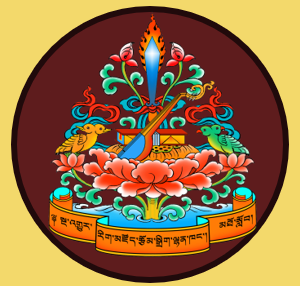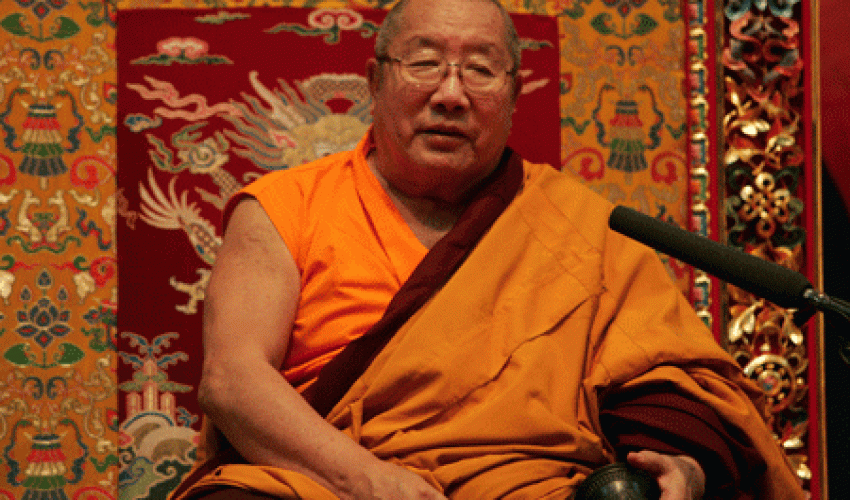Speeches and written messages of H.H. Pema Norbu Rinpoche
Today all of us at Namdroling are gathered here: tulkus, khenpos, teachers and the sangha community. This is the time when we distribute the annual mark sheets for all the shedra (monastic university) students, including the seniors. Everything went well. Thank you.
This is also the beginning of the New Year. Therefore, I don’t have anything more important to say other than what Khenpo Tashi Tsering and Tsewang Phuntshok said. Since all of us have entered the Buddhist path, the most important thing for all of us in the sangha community, especially all the residents of Namdroling—high or low—is to abide by the Vinaya discipline. You who have not received either the novice or full ordination vows must also do so.
After receiving the vows, it is of utmost importance to protect them. Having obtained this human body and having entered the Buddhist path, you should abide by outer, inner and secret vows. Upholding moral discipline, just like protecting your own life, is the most important thing. Just as I always say, it is important to put an emphasis on following the precepts.
I am not boasting but within the Nyingma traditions, it is the Palyul tradition that has been around for some time and since its beginning, its membership has been largely composed of ordained monks and not ngakpas, those pony-tailed, white-clad lay practitioners of whom there may be only one or two, and this is not true only for the mother monastery but for all the branches. It is very important to protect the Vinaya vows just like your own life and this you must do, not only inside Namdroling but also when you are outside. In addition to this, the conduct of monks should be decent, as taught in the scriptures. Even to people of the world in general, there is an accepted way of behaving.
Everybody likes and respects those who are good and everybody dislikes those who are ill-mannered like the quick-tempered, the quarrelsome and the very talkative. Everybody likes those who are patient, harmonious with everyone and always smiling. This is the way of the world. We are followers of the Buddha and must always, therefore, avoid anger and all negative emotions. I don’t mean that we should smile all the time while we are walking and sitting, but when we do, it must come from the heart. Mere appearances won’t do. We should always be peaceful, restrained, tamed, and free from anger, from the depth of our hearts. This is of utmost importance.
You are all studying scriptures, so you know about anger. Of the five poisons, there is no other negative emotion as sinful as anger. There is no other option for one who is angry but to go to hell. Being a monk you won’t be angry but if you are, it is going to be one hundred times more sinful than that of an ordinary person. Therefore, we must always be mentally peaceful and tamed.
When we look at people, we criticize the way they walk, talk and sit, which we shouldn’t do because that is the way people are. We should look, instead, at our own inadequacies—how we sit, walk, and talk and ask ourselves how we are doing. When we, for instance, speak to others, we must first examine our mind and ask ourselves, “How am I to speak?” The same applies to walking, etc. This way of looking at ourselves should not be confined to only these activities but must include everything we do.
The majority of you monks are young and full of energy, so you are proud, fearless and with so much zest for speaking. You must control yourselves as no one else will control you. If it is beneficial, then it is fine, but if it is not, it will only bring ruin to yourself and others. You should never speak from negative thoughts, or of anything that just comes to your mind, within the sangha community. I always say this.
As soon as one enters this monastery, one becomes someone like everybody else. We must not discriminate between newcomers and long-staying monks. We must not say, “He is good” or “He is bad.” We should treat everyone as an equal. Once you enter this monastery, you should have one hundred percent concern for it. By equal, I mean that one must not assert authority over others. That kind of conduct is utterly indecent.
Many people here say, “Give me my share of clothing, food and other things. I live here in Namdroling Monastery.” I don’t owe you anything. I don’t know how you can say it so easily as if I owed you something, but because of my espousal of Buddhism and the thought of benefitting all, I have put up facilities and supplied you with your necessities but you can’t force me, saying, “I need this. I need that.” If you gave me a loan, then you could say, “I gave you loan. Pay me now.” There are many irresponsible people who behave as if I owed them. It is really funny.
There are many who try to enter the monastery under the assumed strength of the recommendation of someone powerful. I see these people as objects of compassion because they don’t know how to think. At the appearance level, it is also not good. Regardless of when one enters the monastery, I help everyone. Some people, out of great pride and thinking they have equal rights with others, obtain benefits, and think they are at a loss when they don’t receive such things. One should not think this way. Equality here means equally studying the Buddhadharma, eating together, sharing joy with others. That is equality. We are not talking about it other than in this context.
I always say, “Do not discriminate among people based on their place of origin or group.” A majority of the monks do not discriminate. However, you must never be discriminating. At the beginning you assume you are a friend of someone. Then in the end, you quarrel. There are many such cases.
When you enter the same monastery, everyone is your friend. You gather in the same temple, eat from the same pot, and use the same cup. How can you find a better friend than this? If you would like a better friend, then that thought would be one that creates conflict because of discrimination. There can’t be any other option. Although I am not efficient, my thinking is that of nurturing everyone within the boundaries of these walls as if they were my children, and I have never discriminated against anyone by thinking, “This person is important. This person is not important. This person is on my side. This person is on that side.” I think I will never do that. According to worldly convention, if I want to do that, I can do that. I would know how to do it. However, as long as we are staying together, I will be happy if we are constant.
There are also some who, out of their concern for this monastery, work day and night. There are also some others who, out of a deep sense of responsibility, work hard to teach or give teachings. There are also some who don’t do anything but just sleep.
If I want to differentiate monks, there are many ways I can do it. For example, the khenpos are very knowledgeable. They can go abroad and they can even gain inexhaustible wealth. They don’t need to remain in Namdroling Monastery, aspiring to get a little bit of tsampa (roasted barley flour). It is not that they are satisfied with this, but they remain here out of their great concern for the preservation of the Buddhadharma.
To be continued
Translated by Khenpo Sonam Tsewang and Joscephine Gomez



